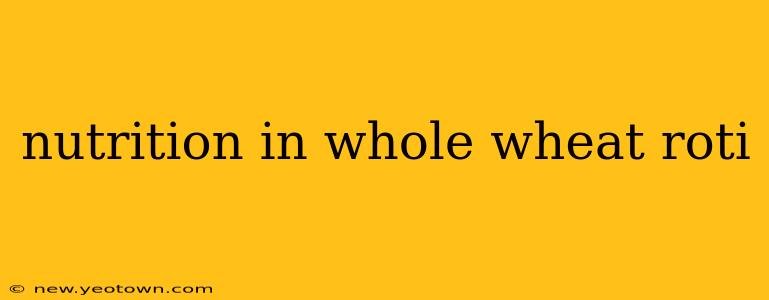The aroma of freshly baked whole wheat roti, a staple in many Indian households, evokes feelings of warmth and comfort. But beyond its delicious taste and satisfying texture lies a nutritional powerhouse packed with essential nutrients vital for a healthy life. Let's delve into the world of whole wheat roti and uncover its impressive nutritional profile.
Imagine this: a warm, slightly chewy roti, the perfect accompaniment to a vibrant vegetable curry or a hearty lentil soup. This isn't just comfort food; it's a carefully crafted delivery system for essential vitamins, minerals, and fiber. This humble flatbread, made from whole wheat flour (atta), offers a significant nutritional advantage over its refined flour counterparts. Why? Because it retains the entire wheat kernel – bran, germ, and endosperm – unlike refined flour which strips away these crucial components.
What are the key nutrients in whole wheat roti?
Whole wheat roti is an excellent source of complex carbohydrates, providing sustained energy throughout the day. But it's the presence of the bran and germ that truly elevates its nutritional value. The bran is rich in fiber, promoting healthy digestion and preventing constipation. The germ, on the other hand, is packed with essential vitamins and minerals, including:
- Fiber: A crucial component for gut health, regulating bowel movements and contributing to feelings of fullness, aiding in weight management.
- Iron: Essential for red blood cell production and preventing anemia. The iron in whole wheat is not as readily absorbed as in some other sources, but it contributes nonetheless to our overall iron intake.
- Magnesium: Important for muscle and nerve function, blood sugar control, and blood pressure regulation.
- Selenium: An antioxidant mineral that protects cells from damage caused by free radicals.
- B Vitamins: Crucial for energy production, nerve function, and cell metabolism. Whole wheat roti contributes to our intake of several B vitamins, including thiamin, riboflavin, and niacin.
- Protein: While not as high in protein as some other foods, whole wheat roti still contributes to our daily protein needs, essential for building and repairing tissues.
How does whole wheat roti compare to refined flour roti?
The difference between whole wheat and refined flour rotis is significant. Refined flour rotis, made from maida, lack the bran and germ, resulting in a lower nutritional profile. They are primarily a source of simple carbohydrates, leading to rapid spikes in blood sugar levels. They lack the fiber, vitamins, and minerals present in whole wheat rotis. Switching from refined flour to whole wheat significantly boosts the nutritional value of your daily meals.
Is whole wheat roti good for weight loss?
Yes, whole wheat roti can be part of a healthy weight loss diet. The high fiber content promotes satiety, keeping you feeling full for longer and preventing overeating. The complex carbohydrates provide sustained energy, reducing cravings for unhealthy snacks. However, portion control remains crucial for effective weight management; even healthy foods should be consumed in moderation.
How many calories are in a whole wheat roti?
The calorie count of a whole wheat roti varies depending on its size and the specific recipe. Generally, a medium-sized roti contains approximately 100-120 calories. However, adding ghee or oil during preparation will increase the calorie count.
What are the benefits of eating whole wheat roti?
The benefits of incorporating whole wheat roti into your diet are numerous:
- Improved Digestion: The high fiber content promotes regular bowel movements and prevents constipation.
- Enhanced Energy Levels: The complex carbohydrates provide sustained energy, avoiding energy crashes.
- Weight Management: The fiber content aids in weight management by promoting satiety.
- Reduced Risk of Chronic Diseases: The vitamins, minerals, and antioxidants help reduce the risk of heart disease, type 2 diabetes, and certain cancers.
Conclusion: A Staple for a Healthy Life
Whole wheat roti isn't just a comforting food; it's a valuable component of a balanced and nutritious diet. By choosing whole wheat over refined flour, you're making a conscious decision to nourish your body with essential vitamins, minerals, and fiber. Incorporate this nutritional powerhouse into your meals and enjoy the delicious taste and remarkable health benefits it offers. Remember that a balanced diet, combined with regular exercise, is key to a healthy lifestyle.

